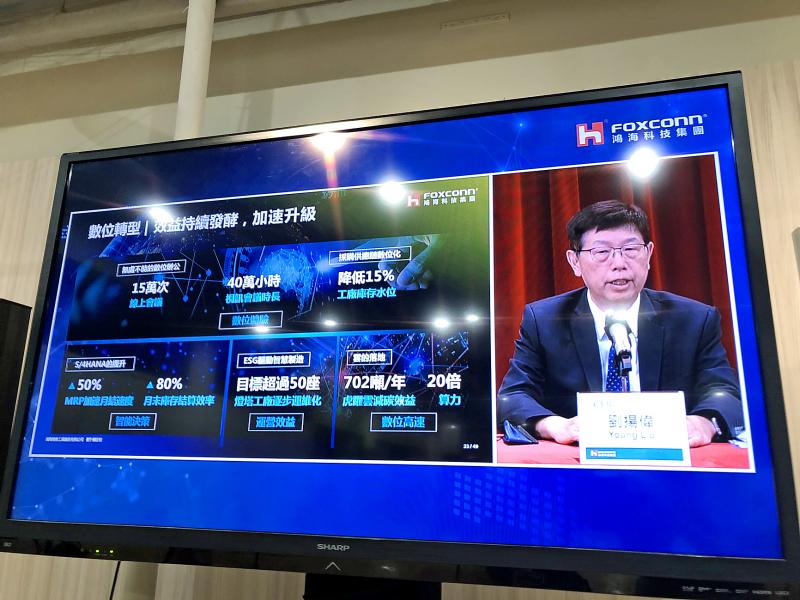Hon Hai Precision Industry Co (鴻海精密) is exploring new business opportunities in technologies related to low Earth orbit (LEO) and smart car connectivity, the company said yesterday.
Hon Hai chairman Young Liu (劉揚偉) last week said that an LEO satellite from Hon Hai might be seen in the sky next year, as the company aims to create more value and higher returns for its shareholders, while the firm told yesterday’s forum that Microelectronics Technology Inc (台揚科技), a 5G equipment and satellite component supplier that it fully owns via its subsidiaries, has tapped into the LEO satellite receiver market.
At the NExT Forum, organized by the Hon Hai Research Institute (鴻海研究院), industry experts discussed the development of 5G and 6G (B5G) technologies, as well as opportunities that lie beyond, focusing on LEO supply chains and their link to the fulfillment of autonomous vehicles.

Photo: CNA
Numerous applications rely on having full coverage of B5G, LEO and low-latency networks with high-reliability design, research institute chairman Wu Jen-ming (吳仁銘) said.
National Space Organization Director-General Wu Jong-shine (吳宗信) said that a large-scale company such as Hon Hai should tap into space travel and space colonies, adding that such businesses would drive growth over the next 20 to 30 years.
To meet growing demand for full Internet coverage, especially in rural areas, existing 5G networks can be integrated with 6G technology or LEO satellite technology, Wu said.
There are four LEO satellite projects globally: SpaceX’s Starlink, the UK and India’s Oneweb, Amazon.com Inc’s Project Kuiper and Canada’s Telesat, he said.
By the end of the year, Starlink is to take the lead with 3,400 satellites launched, he said.
Some local networking companies and precision machinery companies have joined Starlink’s supply chain, supplying ground equipment for satellites, he added.
Wu said he is upbeat about business opportunities related to LEO satellites, as there are expected to be 50,000 satellites in the sky by 2030, with 77.5 percent of them being LEO satellites.
The ground equipment segment in 2020 comprised a significant portion of the global space economy, contributing US$135.3 billion, data compiled by Bryce Space and Technology and Euroconsult showed.
The global space economy is expected to expand to US$1 trillion by 2040 from US$371 billion in 2020, Wu said.
The satellite industry accounted for 74 percent of the global space economy in 2020, he said, citing data from Bryce Space and Technology and Euroconsult.
The research institute, which was established in January last year, directs the exploration of next-generation telecommunications and semiconductor technologies. It has focused on 5G-related technologies, satellite payload technologies and the ability to deploy satellite receiving stations.

TAKING STOCK: A Taiwanese cookware firm in Vietnam urged customers to assess inventory or place orders early so shipments can reach the US while tariffs are paused Taiwanese businesses in Vietnam are exploring alternatives after the White House imposed a 46 percent import duty on Vietnamese goods, following US President Donald Trump’s announcement of “reciprocal” tariffs on the US’ trading partners. Lo Shih-liang (羅世良), chairman of Brico Industry Co (裕茂工業), a Taiwanese company that manufactures cast iron cookware and stove components in Vietnam, said that more than 40 percent of his business was tied to the US market, describing the constant US policy shifts as an emotional roller coaster. “I work during the day and stay up all night watching the news. I’ve been following US news until 3am

Six years ago, LVMH’s billionaire CEO Bernard Arnault and US President Donald Trump cut the blue ribbon on a factory in rural Texas that would make designer handbags for Louis Vuitton, one of the world’s best-known luxury brands. However, since the high-profile opening, the factory has faced a host of problems limiting production, 11 former Louis Vuitton employees said. The site has consistently ranked among the worst-performing for Louis Vuitton globally, “significantly” underperforming other facilities, said three former Louis Vuitton workers and a senior industry source, who cited internal rankings shared with staff. The plant’s problems — which have not

TARIFF CONCERNS: The chipmaker cited global uncertainty from US tariffs and a weakening economic outlook, but said its Singapore expansion remains on track Vanguard International Semiconductor Corp (世界先進), a foundry service provider specializing in producing power management and display driver chips, yesterday withdrew its full-year revenue projection of moderate growth for this year, as escalating US tariff tensions raised uncertainty and concern about a potential economic recession. The Hsinchu-based chipmaker in February said revenues this year would grow mildly from last year based on improving supply chain inventory levels and market demand. At the time, it also anticipated gradual quarter revenue growth. However, the US’ sweeping tariff policy has upended the industry’s supply chains and weakened economic prospects for the world economy, it said. “Now

COLLABORATION: Given Taiwan’s key position in global supply chains, the US firm is discussing strategies with local partners and clients to deal with global uncertainties Advanced Micro Devices Inc (AMD) yesterday said it is meeting with local ecosystem partners, including Taiwan Semiconductor Manufacturing Co (TSMC, 台積電), to discuss strategies, including long-term manufacturing, to navigate uncertainties such as US tariffs, as Taiwan occupies an important position in global supply chains. AMD chief executive officer Lisa Su (蘇姿丰) told reporters that Taiwan is an important part of the chip designer’s ecosystem and she is discussing with partners and customers in Taiwan to forge strong collaborations on different areas during this critical period. AMD has just become the first artificial-intelligence (AI) server chip customer of TSMC to utilize its advanced